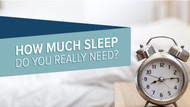How Much Sleep Do You Really Need?
Posted by Ivan Dela Cruz on 25th Nov 2020
The truth about the 8-hour rule and how it could affect your health.
Who doesn’t love sleep?
Harvard sleep scientist Dr. J Allan Hobson once joked: “The only known function of sleep is to cure sleepiness.” It quite of made a point, back when the days are dark and there were no means to literally scan and know what’s going on inside our hard-rock skulls. A century after, this proved untrue—and the questions of why we spend about a third of our lives asleep and what goes on in our head during this time are far from being solved.
SLEEP 101: What’s going on in our brains while we sleep?
The brain is not a machine, no, because machines can be switched off. You can’t switch off (or shut down) the brain, unless you want to experience induced comatose or you hit your head so hard you got brain dead. And you don’t want that.
Sleep is like a cooled down period—a break, a pause, whatever. It’s a state characterized by changes in brain wave activity, breathing, heart rate, body temperature, and other physiological functions. Sleep is a period of reduced activity that promotes complete rest of the body, and a decreased responsiveness to external stimuli and consciousness.
For most people, sleep is the best part of the day. Touché.
So, how much sleep is enough?
When you ask people how much they sleep, you’d probably get a 7-9 hour range. And that explains the 8-hour median; the rule-of-thumb that in order for you to stay healthy, you need to follow that third-of-a-day sleep regimen. Does science support this need? If you want a straightforward answer, then it’s a no. Research supporting the need for at least 8 hours of sleep per night does not exist.
The US National Sleep Foundation, however, concluded that there’s an ideal amount of sleep per age group—seven to nine hours for adults and eight to ten hours for teens and kids. Newborn babies and infants need at least 12 hours up to 17 hours each day to boost immunity. There are at least 320 existing research titles backing these claims, so we better follow these recommendations.
Experts, however, did not consider quality of sleep. Because it’s true—some people may survive on less sleep because they sleep well. What affects sleep quality?
“A mattress can impact a person’s sleep,” says Michael Decker, PhD, RN, associate professor at Georgia State University. “When you lie on any part of your body for an extended period of time, the weight of it reduces blood flow through those vessels, which deprives the skin of oxygen and nutrients.” This is the reason why you roll over during your sleep multiple times; nerve cells and pain sensors in your skin send messages to your brain so you can restore blood flow to the area, but it also briefly interrupts your sleep – quality is therefore compromised.
Ideally, a mattress that reduces the pressure points on your body should give you a good night’s sleep, minimizing the “rolling overs.” Yet the ideal mattress is different for each person.
Which mattress is right for you? Icon Sleep offers a wide range of mattresses that will help you sleep better. You can check out our products

